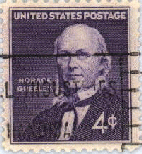FRtR > Outlines > American History (1963) > Chapter Four > Westward Expansion and Regional Differences: Introduction
An Outline of American History (1963)
1/10 Westward Expansion and Regional Differences: Introduction
< Previous Chapter * Next Page >
"Go west, young man, and grow up with the country."
Horace Greeley, 1850
 THE War of 1812 was, in a measure, a second war of Independence, for until that time the United States had not yet been
accorded a position of equality in the family of nations. After the treaty ending the war, the United States was never again
refused the treatment due an independent nation. Most of the serious difficulties under which the young republic had labored
since the Revolution now dropped out of sight. With national union achieved, a balance between liberty and order secured, a
trifling national debt, and a virgin continent awaiting the plow, there opened a serene prospect of peace, prosperity, and social
progress.
THE War of 1812 was, in a measure, a second war of Independence, for until that time the United States had not yet been
accorded a position of equality in the family of nations. After the treaty ending the war, the United States was never again
refused the treatment due an independent nation. Most of the serious difficulties under which the young republic had labored
since the Revolution now dropped out of sight. With national union achieved, a balance between liberty and order secured, a
trifling national debt, and a virgin continent awaiting the plow, there opened a serene prospect of peace, prosperity, and social
progress.
Politically this was an "era of good feeling," as contemporaries called it, and a spirit of unity pervaded the reconstruction
measures which followed the peace. Commerce was cementing the American people into a national entity. The privations of the
war period had shown the importance of protecting the manufactures of America until they could stand alone against foreign
competition. Economic independence, it was urged, was as essential as political; indeed, political independence was hardly a
reality without economic selfsufficiency and, as the Revolutionary War had been fought for the one, so now it was proposed to
win the other. Henry Clay and John C. Calhoun, Congressional leaders at the time, believed in "protection"-that is, the passage
of a tariff which permitted the development of American industry.
It was a propitious moment to raise the customs tariff. The shepherds of Vermont and Ohio wished protection against an influx
of English wool; in Kentucky, a new industry of weaving local hemp into cotton bagging was men aced by the Scotch bagging
industry; Pittsburgh, already a flourishing center of iron smelting, was eager to fill the demand now adequately supplied by
British and Swedish iron. And so, the tariff passed in 1816 imposed rates of duty high enough to give the manufacturers a taste
of real protection. In addition, a national system of roads and canals was being warmly advocated by those who pointed out
that better transportation would bind the east and west more closely together.
The position of the federal government at this time was greatly strengthened by the declarations of the Supreme Court. The
convinced Federalist, John Marshall of Virginia, was made Chief Justice in 1801 and held that office until his death in 1835.
The court which had been weak before his administration he transformed into a powerful tribunal, occupying a position as
important as that of Congress or the President. In a succession of historic decisions, Marshall never deviated from one cardinal
principle- the sovereignty of the federal government.
Not merely a great judge, Marshall was a great constitutional statesman. When he finished his long service, he had decided
nearly fifty cases involving clear constitutional issues. Thenceforth, the Constitution, as the courts applied it throughout the
country, was to be in great degree the Constitution as Marshall interpreted it. Among the most famous of his opinions was
rendered in the case of Marbury vs. Madison in 1803 when he decisively established the right of the Supreme Court to review
any law of Congress or of a state legislature. Again, in McCulloch vs. Maryland in 1819, he dealt with the old question of the
implied powers of the government under the Constitution. Here he stood boldly in defense of the Hamiltonian theory that the
Constitution by iniplication gives to the government powers in addition to those which it expressly states. By such decisions,
Marshall did as much as any leader to make the central government of the American people a living, growing force.
< Previous Chapter * Next Page >
 THE War of 1812 was, in a measure, a second war of Independence, for until that time the United States had not yet been
accorded a position of equality in the family of nations. After the treaty ending the war, the United States was never again
refused the treatment due an independent nation. Most of the serious difficulties under which the young republic had labored
since the Revolution now dropped out of sight. With national union achieved, a balance between liberty and order secured, a
trifling national debt, and a virgin continent awaiting the plow, there opened a serene prospect of peace, prosperity, and social
progress.
THE War of 1812 was, in a measure, a second war of Independence, for until that time the United States had not yet been
accorded a position of equality in the family of nations. After the treaty ending the war, the United States was never again
refused the treatment due an independent nation. Most of the serious difficulties under which the young republic had labored
since the Revolution now dropped out of sight. With national union achieved, a balance between liberty and order secured, a
trifling national debt, and a virgin continent awaiting the plow, there opened a serene prospect of peace, prosperity, and social
progress.